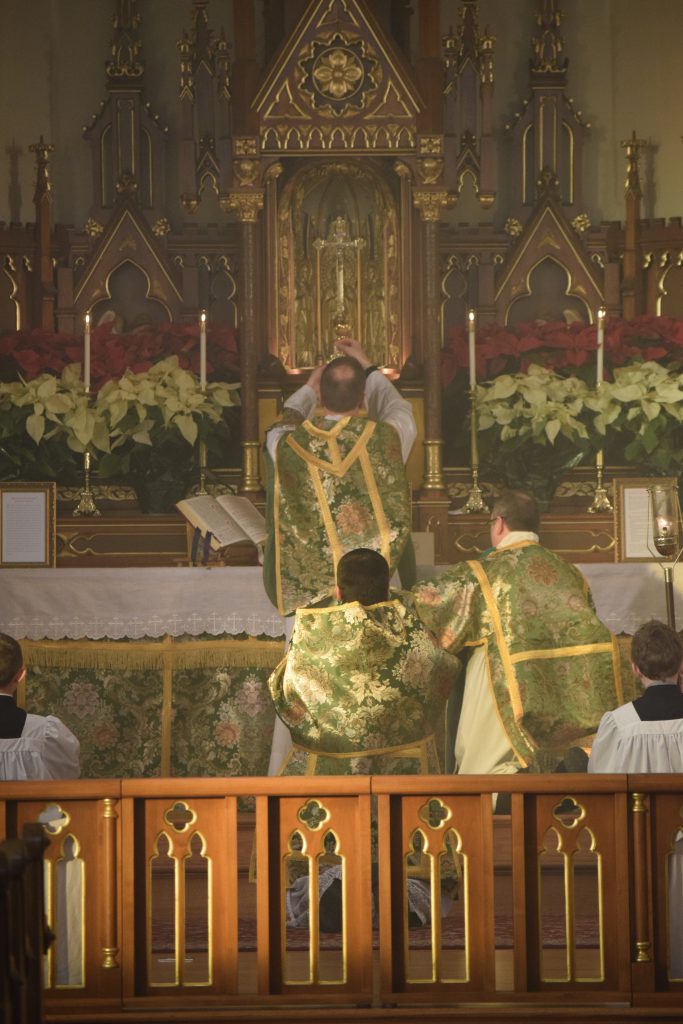 In the Novus Ordo this Sunday it is the 30th Sunday of what an old friend of mine (rest in peace) called “Greater Meatloaf Season”.
In the Novus Ordo this Sunday it is the 30th Sunday of what an old friend of mine (rest in peace) called “Greater Meatloaf Season”.
Let’s look at upcoming Sunday’s Novus Ordo Collect. This prayer has a precedent in the 1962MR as the Collect for the 13th Sunday after Pentecost. It was also in the Veronese and Gelasian, ancient sacramentaries both.
Omnipotens sempiterne Deus, da nobis fidei spei et caritatis augmentum, et ut mereamur assequi quod promittis, fac nos amare quod praecipis.
OBSOLETE ICEL (1973 translation of the 1970MR):
Almighty and ever-living God,
strengthen our faith, hope, and love.
May we do with loving hearts
what you ask of us
and come to share the life you promise.
SUPER LITERAL TRANSLATION:
Almighty eternal God, grant us an increase of faith, hope and charity, and cause us to love what You command so that we may merit to obtain what You promise.
CURRENT TRANSLATION:
Almighty ever-living God,
increase our faith, hope and charity,
and make us love what you command,
so that we may merit what you promise.
Today we pray to God the Father for an increase of the theological virtues: faith, hope and charity.
By baptism we were endowed with a supernatural life. As the German writer Josef Pieper (+1997) wrote, a supernatural life can be described as having three main currents.
First, we have some knowledge of God surpassing what we can know about Him naturally because He reveals it to us (faith).
Second, we live by the patient expectation that what we learn and believe God promises will indeed be fulfilled (hope).
Third, comes our affirmative response of love of God, whom we have come to know by faith, and also love of our neighbor (charity).
While natural human virtues are acquired through education and discipline, the three theological virtues faith, hope and charity are given to us by God. They are infused into us with grace at baptism.
Looking at the positive development of the theological virtues, we can say that faith logically precedes hope and charity, and hope precedes charity.
From the negative point of view, considering their unraveling and loss, we lose charity first of all, and then hope and, last of all, our faith. Charity is the greatest of the three, followed by hope and then faith.
As an aside… there are many believers out there who have fallen away. They need your help to return. Faith is the last thing to go. Many who lead quite dissolute lives still believe. A tiny coal preserved in the ash of a dead fire can be fanned to life with exposure and a little TLC, a few puffs of reviving air. But I digress…
The theological virtues perfect and elevate everything virtuous thing man can do naturally. They can be considered logically, one at a time, but are all three intimately woven together. St. Augustine (+430) says, “There is no love without hope, no hope without love, and neither love nor hope without faith” (enchir 8).
The goal of the virtuous life, as we read in the Catechism of the Catholic Church (1803), is to become like God. Living the theological virtues concretely reveals God’s image in us as well as the grace He gives to His adopted children. Today we pray for their increase.
This Sunday we also pray to love what God commands.
Doing what another commands is not always pleasant. Our wills and passions rebel and we prefer to command rather than be commanded.
It is easy, from the worldly point of view, to think that by being the commander, rather than the commanded, we can find peace. Surely each one of us desires peace and happiness and we seek after the means to attain them. If we attach our hopes to the created, passing things of this world to find peace and happiness we are inevitably disappointed.
All created things, including people, can be lost. They cannot be the foundation of lasting peace. Even the fear of their loss lessens our peace in this world.
God alone gives the peace and happiness we seek. He alone is eternal, unchanging, forever trustworthy. We cannot lose God unless we ourselves reject Him. And, in the end, God, the source of peace, remains in command.
In Canto III of the Paradiso of the Divine Comedy the poet Dante is in the Heaven of the Moon. He encounters the soul of Piccarda. Dante queries her about the happiness of the blessed in heaven wondering if somehow, even in heaven, souls might be disappointed that they do not have a higher place in celestial realm.
In response Piccarda utters one of the greatest phrases ever penned or recited (l. 85):
In His will is our peace.
It is that sea to which all things move,
both what it creates and what nature makes…
We are all made in God’s image and likeness, made to act as God acts. He reveals something of His will to us. When we obey Him we act in accordance with the way He made us and what He intended for us. In obedience we find happiness and peace, even amidst the vicissitudes of this troubling and passing world.
Our Collect prays that we “love what you command”. This is a prayer for happiness. The theological virtues provide the key.
E ‘n la sua volontade è nostra pace.
In His will is our peace.




































Dear Father,
I would be very interested to know more about the origin of the phrase “greater meatloaf season”.
Pray tell!
In the traditional calendar tomorrow is the Feast of Christ the King. There are no ‘ordinary Sundays’ in the traditional calendar.